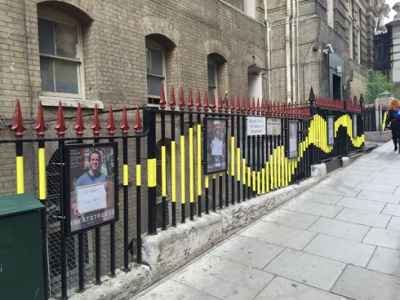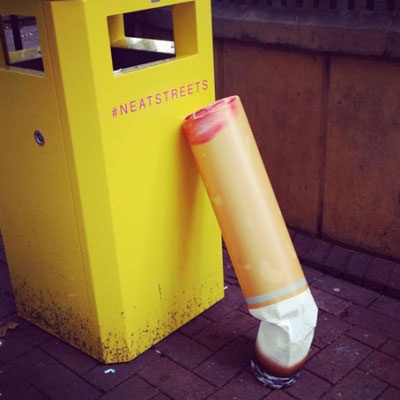Hubbub releases results of Neat Streets campaign
 Sustainability charity Hubbub has released a report detailing the results of its Neat Streets Campaign, a five-month social experiment designed to test innovative methods for reducing street litter.
Sustainability charity Hubbub has released a report detailing the results of its Neat Streets Campaign, a five-month social experiment designed to test innovative methods for reducing street litter.
The campaign, which took place in Villiers Street in Central London between May and October last year, was launched with the support of Westminster City Council, which says that it collects 40-45 bags of rubbish per day (220-225 kg) from Villiers Street alone, over several collections.
The mainly pedestrianised street was chosen as it has the second highest footfall in London, a large cross-section of pedestrians and many different businesses such as pubs, restaurants, takeaways and a nightclub. It was also noted to have a significant litter problem by several local businesses.
The Neat Streets initiative set out to test new litter-reducing methods combined with new behaviour change techniques developed around the world. Hubbub says it wanted to share the results of the project in order to ‘speed up transition to a litter-free UK’.
Neat Street initiatives
To try to find a solution to the fact that litter costs the UK £850 million per year in street cleaning services, Hubbub created several campaigns with the help of design organisations Gumdrop Ltd, Ioglo and Commonworks, as well as students and young people.
Some measures, such as the introduction of brightly coloured bins, were intended to help pedestrians to more easily identify disposal areas on the busy street. Others such as the ‘Talking Rubbish’ and ‘Fumo’ initiatives, bins that made noises when rubbish or cigarette butts were deposited in them, tried to change behaviour by making disposing of rubbish more fun and therefore reinforcing the behaviour. Another attempt at changing behaviour came in the form of portable chewing gum or cigarette bins, which tested the theory that if you make it easier to change a specific behaviour then that change will most likely occur.
The ‘My Street Is Your Street’ project, a photo gallery of local people holding signs carrying the same slogan, and the ‘Chalking the Talk’ initiative, where chewing gum and cigarette litter were highlighted with chalk, aimed to make the litter problem more visible to pedestrians.
Peppermint pointillism, where used chewing gum was turned into art work, and a cigarette butt voting bin were also included in the five month campaign, as were street actors The Naked Bin Men.
Results
 Street litter and pedestrian littering behaviour was monitored monthly over the six-month campaign. Results were compared to a baseline of an initial litter audit, which was carried out by Keep Britain Tidy in May 2015.
Street litter and pedestrian littering behaviour was monitored monthly over the six-month campaign. Results were compared to a baseline of an initial litter audit, which was carried out by Keep Britain Tidy in May 2015.
By the end of the campaign, Hubbub claims the amount of litter produced had dropped by 25 per cent and total littering behaviour by 16 per cent, suggesting some success for the implanted initiatives.
The charity also found that amount of used chewing gum on the street was successfully reduced during the campaign but in the month following its completion the amount returned to baseline levels. Moreover, litter related to cigarettes showed a decrease during the entire six months, according to the report. The lowest level was noted in September when initiatives specifically targeting cigarette litter were in place.
Lessons learned
The report noted that on such a busy street it was easy to pass through without seeing campaign advertisements and notices. These had to be designed specifically with the use of colour and simple messages to make them stand out.
The use of ‘simple, playful messages targeted at specific groups’ was seen as being key to the success of initiatives, as was collaboration, especially with the local community, whose input can not only help create campaigns but allow them to adapt.
The use of a concentrated area, such as Villiers Street, was also highlighted as a good thing, as it enabled the observation of small details during the trials and made it easier to judge which were the most effective.
Three more Neat Streets campaigns have been planned in 2016 in Leeds, Birmingham and a yet to be determined location in Scotland. Some of the initiatives from the Villiers Street pilot will be implemented in these areas along with new interventions.
These will provide Hubbub with a body of evidence, which will allow them to more efficiently assess the impact of their anti-littering campaigns
Results called into question
The reliability of the results has been called into question by some commentators, however. Chris Sherrington of Eunomia Research and Consulting, wrote for the company’s Isonomia blog that the lack of monitoring of the amount of waste deposited in bins calls into question how much of an effect the initiatives had on the reduction of litter over the trial period.
Sherrington pointed out that Keep Britain Tidy (KBT), which released an evaluation of the Neat Streets initiative toward the end of 2015, had suggested that monitoring the waste put in bins would allow fluctuations in the overall amount of waste in to be accounted for, such as during warmer periods or special events when footfall tends to increase.
He wrote ‘[the report] observes that, while Neat Streets was running, the number of littered items increased in June and July, peaked in August, and then started to decrease…
‘It seems quite possible, therefore, that autumn, and not Neat Streets, can take credit for at least some, perhaps all, of the “massive” reduction in litter reported. Unfortunately, the monitoring was insufficient to enable the background trend to be excluded, which is a real shame. A good evidence base regarding approaches trialled in the various Neat Streets campaigns would really have helped us to understand their cost-effectiveness and whether they’re worth replicating.’
Sherrington also pointed out that the number of trials taking part simultaneously and the lack of control a control site make it hard to draw conclusions; he quoted the KBT report as saying: ‘Given that many activities took place, often simultaneously and with no control site monitored, it is not possible to assess whether any particular project made a significant enough difference to support its replication elsewhere.’
National five-point manifesto
In addition to the Neat Streets report, Hubbub has also created a national five-point manifesto with the assistance of businesses and NGOs. The points are aimed at the government; businesses, NGOs and local authorities; local organisations; the media with the final point aimed at everyone.
The main aim of the manifesto is to encourage those targeted by the five points into action to combat the litter problem in the UK. Sixteen signatures were secured by organisations supporting the manifesto, including Keep Britain Tidy, the Beer and Pub Association, British Plastics Federation, McDonald’s and The Wrigley Company.
A ministerial letter was also sent to encourage the government to set up a litter advisory committee. This letter received 27 signatures, which in addition to the organisations previously mentioned, included Costa Coffee, Pret a Manger, Coca-Cola Enterprises and Café Nero.
Project ‘ignited interest, discussion and action’
In a comment included in the impact report, Lloyd Evans, from the McDonald’s restaurant located at the top of Villiers Street said: ‘The Neat Streets project in Villiers Street throughout 2016 has been extremely beneficial and enjoyable. It has ignited interest, discussion and action in an area of the community that we have always been engaged in, that of litter – though often simply its collection. This [has] been about prevention. Importantly it has done so in a fun, unusual and exciting way.’
The Neat Streets impact report can be downloaded from Hubbub’s website



